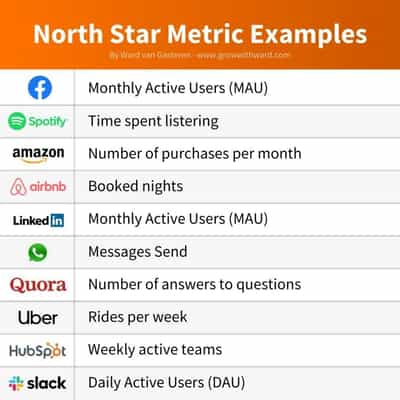What guides your Procurement team? I don’t mean current contracts, products, projects, or initiatives. When asking, “What are you working towards”, I mean the big picture. What’s the mission, vision, and end goal of your company and/or your function? What is your guiding light? What displays the culmination of your hard work?
What is your North Star Metric?
The North Star Metric (NSM) 💫
As published by Forbes in a 2017 article, “The North Star metric concept originally emerged from Silicon Valley and is best utilized by companies that invest in long-term sustainable growth. It focuses on the product and the core value it delivers to customers. The value your customers receive from your product is measured by key steps in the consumer lifecycle” (Forbes 2017).
Essentially, a North Star Metric should be the single metric that captures the core value your product — or service — delivers to your customers. For example, Facebook’s North Star Metric is “monthly active users”, Medium’s north star is “total time reading”, and Airbnb’s measures “nights booked”. See more examples in the image below.

Defining, Refining, Aligning, and working towards a North Star is common practice within Tech ventures (especially SaaS) as it can be a bit simpler (in comparison to retail or manufacturing, for example) to identify value levers and KPI metrics that lead directly to customer value and business success.
Regardless of the industry, the principle remains, a North Star Metric is an umbrella metric, in which every function works towards, and can be utilized as a foundation of many strategic business decisions.“To qualify as a “North Star,” a metric must do three things: lead to revenue, reflect customer value, and measure progress. If a metric hits those three points, and every department contributes to improving it, the company will grow sustainably, or so the theory goes” (Mixpanel).
"The whole is greater than the sum of its parts."
Maintaining a North Star Metric allows a business to align on targets and remain steadfast in vision. When the North Star takes precedence as an overarching goal, then it’s rather simple to break down individual functions and metrics that empower teams in the business to feel accountability & ownership.
In order to truly create sustainable growth, and work towards a North Star, each function in the business needs to take individual responsibility for defining, refining, aligning, and working towards their own set of sub metrics, “so individual contributors can draw a clear connection between their daily duties and the North Star” (Mixpanel).
These sub-metrics should be your own mini-North Star Metrics.
So… What’s your Procurement team’s North Star?
How To Locate Your Procurement Team’s North Star Metric(s)
In order to locate and define your individual Procurement team’s North Star Metric(s), we’re working from the assumption that your company has an overarching corporate North Star Metric that has been defined and implemented by the organization’s leadership. If your company doesn’t have a corporate North Star Metric, it does not exclude you from locating and working towards your own North Star within Procurement, but it’s important to remember that the whole is greater than the sum of its parts.
Pretty much, you can’t solely act Maverick and start a journey towards your own North Star without aligning your goals with the direction and whole of the business. This kind of deviation defeats the purpose of finding your North Star and might put you on a path to the North Pole instead.
As we’ve mentioned earlier in this post, the “heart of the North Star Framework is the North Star Metric, a single critical rate, count, or ratio …” (Ellis 2017).
At the core of the North Star and sub-metric(s) you define within the procurement organization it’s important to try and remain true to the purpose of the North Star, by finding metrics that are anchored in customer value, revenue growth, and progress/achievement measurement.
5 Key Tips to Find Your North Star Metric
- Ask: what is essential to the business’ functioning? Prioritize a list.
- Ask: what is essential that the Procurement function does for the broader business? Prioritize a list.
- Ask: what KPIs and metrics measure the top few, key factors?
- Ask: what metric encapsulates all of the above?
- Build a metric hierarchy – with the North Star metric on top of the pyramid (Mixpanel)
Potential Procurement North Star(s)
To point you in the right direction, and start to get the wheels rolling, our team at Kodiak Hub would like to lay out a hypothetical situation, so you understand what some potential North Star Metric(s) could look like within procurement…
Let’s say that you’re working in manufacturing, or consumer goods and your business’ North Star Metric is ‘# of Units Purchased’, then your North Star & sub-metrics within the procurement organization should always be a subset of this overarching goal.
Let’s start by asking ourselves, what can Procurement do to ensure that there are more # of Units Purchased?
In my opinion, there are 3 primary areas that Procurement can impact to ensure you’re doing your part in the bigger scheme of things, always pointing due North:
- Manage Costs and deliver Savings
- Ensure Product Quality and Sustainability
- Manage and Improve Supply Chain performance and Delivery
Anything you do, measure, and/or develop within procurement should be servicing these three areas and leading back to the overall North Star — selling more units. It may help to become even more granular & follow up on sub-metrics to the 3 areas above. Below are some examples of more granular, daily, weekly, monthly, and quarterly KPIs that will help you to stay on track working towards your business’ overall North Star, and your individual Procurement sub-Metrics:
Manage Costs & Deliver Savings
- PO & Invoice Accuracy
- Savings per Negotiation
- Cost per Invoice & PO
- Spend Under Management
Ensure Product Quality & Sustainability
- Number of Claims
- Number of Complaints
- PPM Ratio
- Emissions/Footprint per Component
- Supply Chain Compliance Ratio
Manage & Improve Supply Chain Performance & Delivery
- Price Competitiveness
- Lead Time and/or OTIF
- Vendor Innovation Capacity
- Vendor Engagement Rate
- Vendor Availability
Now that you have some insight and inspiration to find your own North Star Metric(s) it’s important that you identify the right vessel to guide you on the journey.
Reaching the North Star: People & Technology
If you’re going to work towards your North Star, you’ll need a sturdy rocketship that will propel you past your competition.
People and Tech will serve as your vessel to keep your North Star Metric on a steady growth path, and it’s very important to have a company culture and infrastructure that cater to your North Star.
“Without cross-silo relationships and a willingness to prioritize the company well above the team good, some employees may reject the North Star metric, especially if they must change their behavior significantly … . (Mixpanel).
Procurement can’t be afraid to reach across functional boundaries and break down silos to achieve growth and development. It’s important that leadership also understands the part that Procurement — as a function — can play in obtaining revenue growth and enhanced customer value.
Any procurement team that truly expects to make a splash, and impact the business’ North Star Metric will require modern technology to follow up on an array of sub-metrics, increase visibility with better data visualization/advanced analytics, and report progress to the broader business.
One small step for procurement could mean one giant leap for the rest of your business.
Now you’re ready to find your Procurement Team’s North Star.
Safe travels!











